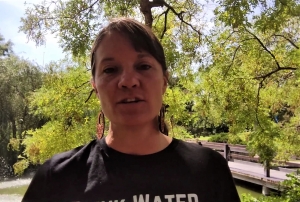Testimony on State Methane Rules: Rhonda Newby-Torres
Members and supporters of New Mexico Interfaith Power & Light have prepared testimony for hearings held by the Environmental Improvement Board. The hearings, held the week of Sept. 20-24, are in support of the The New Mexico Environment Department’s (NMED) strong proposal to cut ozone-forming volatile organic compounds (VOCs) and methane released by the oil and gas industry. The following statement comes from Rhonda Newby-Torres, lay pastor at Luther House (Lutheran Campus Ministry for UNM and CNM).
 Dear Pamela Jones, NMED, and Governor Lujan Grisham,
Dear Pamela Jones, NMED, and Governor Lujan Grisham,
I am writing to ask you to protect New Mexicans.
I am from Carlsbad, NM where you no doubt know that the oil and gas industry is centralized. I have watched the beautiful community of my hometown deteriorate over the last 15 years as the oil and gas industry has “boomed” and created chaos in Carlsbad. It is heartbreaking to watch my home community suffer because of the oil and gas industry.
However, it is far more heartbreaking when my friends and community members die due to the negligence of the oil and gas industry. Two young men who I grew up with both died due to gas leaks at a work cite. In addition, families and communities in Carlsbad are experiencing a multitude of health issues related to the excessive amount of oil and gas wells within the residential communities.
We must protect our communities from the negligence of the oil and gas industry! Just 1 year ago the gas cite directly across the street from my parents house exploded in the middle of the night. The fire did not make it to my parents house, but they did have to evacuate for their lives. This kind of negligence is unacceptable.
Finally, New Mexico is experiencing extreme weather conditions and drought. Our climate warming is directly linked to the amount of methane gas released during oil and gas production. We cannot continue this way.
NM needs more frequent inspections to find and fix leaks. We need stronger requirements for operators and we need to strengthen requirements to cut pollution from pneumatic controllers that are used in oil and gas production.
Thank you for your time, consideration, and action,
Pastor Rhonda Newby-Torres
Lutheran Campus Ministry of New Mexico
